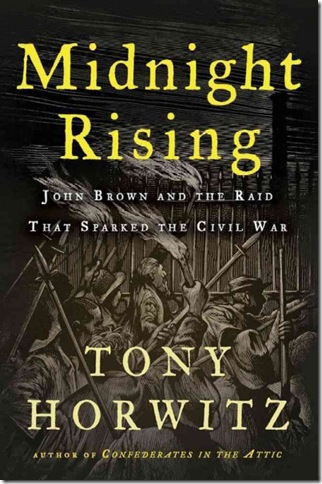Although some people viewed John Brown as a madman, his daring 1859 raid on the U.S. military arsenal at Harpers Ferry, Va., helped galvanize anti-slavery sentiment in the North.
In Midnight Rising: John Brown and the Raid That Sparked the Civil War, Tony Horwitz has written an engrossing account of Brown’s life and singular devotion to the abolition cause. With hindsight, Horwitz suggests that Harpers Ferry seems like “an al-Qaeda prequel,” with a homegrown fundamentalist consumed by hatred of the U.S. government, launching a suicidal attack on a symbol of American power.
From his days as a youth, Brown abhorred slavery. At age 12 he witnessed the beating of a slave boy with iron shovels, and later helped escaping slaves travel North on the Underground Railroad. He cited the Bible in claiming to be on a divine mission to abolish slavery.
In the 1850s Brown traveled through Northern states and Canada seeking volunteer fighters and financial backing. Potential recruits often were perplexed about Brown’s goals, in part because he seems to have changed his mind frequently about exactly what he hoped to accomplish by capturing a government arsenal.
Did Brown intend to arm slaves with thousands of guns taken from the arsenal? The specifics were never entirely clear. Before the Harpers Ferry raid, Brown convened his supporters, who drafted a constitution and declared that they wanted to form a slave-free nation.
Setting out in the middle of the night, Brown’s ragtag group of 19 fighters attacked and easily captured the lightly guarded arsenal, where 100,000 guns were stored. But within 30 hours government troops took back the arsenal, leaving most insurgents dead, dying or wounded. Brown and a few of his comrades were tried, convicted and hanged.
The attack on Harpers Ferry divided the abolition movement. Many who opposed slavery also opposed resorting to violence to end it.
During Brown’s trial, some suggested that he plead not guilty by reason of insanity, but he flatly rejected such a defense. To the end he was willing to die in the cause of abolition, while asking why it was a crime to try to free slaves.
Among Brown’s prominent supporters was Ralph Waldo Emerson, who suggested that Brown was “the new saint awaiting his martyrdom, and who, if he shall suffer, will make the gallows glorious like the cross.”
Horwitz places Brown’s crusade in the context of the nation’s deep division over slavery. “Harpers Ferry,” he writes, “helped propel [Abraham] Lincoln into the White House, where he would ultimately fulfill Brown’s mission. … Harpers Ferry wasn’t simply a prelude to secession and civil war. In many respects, it was a dress rehearsal.”
Lincoln was a late convert to abolition. A native of slave state Kentucky, he initially thought that slavery would fade away and that former slaves would be resettled in Africa. But three years after Harpers Ferry, with the nation mired in the Civil War inferno, Lincoln issued the Emancipation Proclamation, freeing slaves in the South.
Midnight Rising includes 70 pages of notes, a bibliography and an index, as well as portraits and maps, making this an essential work for school and public libraries.
The author deserves credit for writing an even-handed account of a complex man. It would have been easy to dismiss Brown as a crackpot, but Horwitz eschewed that approach and instead sought to get inside Brown’s mind and heart to learn as much as possible about what drove him to embark on a passionate, yet foolhardy, mission that had little chance of success.
Horwitz scoured letters, journals, speeches and books to better understand Brown and the culture that shaped him.
The result is a meticulous tour of an important slice of American history, with Horwitz weaving together vignettes of frontier hardship, the cruelties of slavery, the savagery of battle, the armory takeover, and the trials and executions of Brown and his soldiers.
Midnight Rising is historical non-fiction at its best, coming alive in the hands of a superb storyteller.
Bill Williams is a freelance writer in West Hartford, Conn., and a former editorial writer for The Hartford Courant. He is a member of the National Book Critics Circle and can be reached at billwaw@comcast.net.
Midnight Rising: John Brown and the Raid That Sparked the Civil War, by Tony Horwitz; Henry Holt, 365 pp., $29
